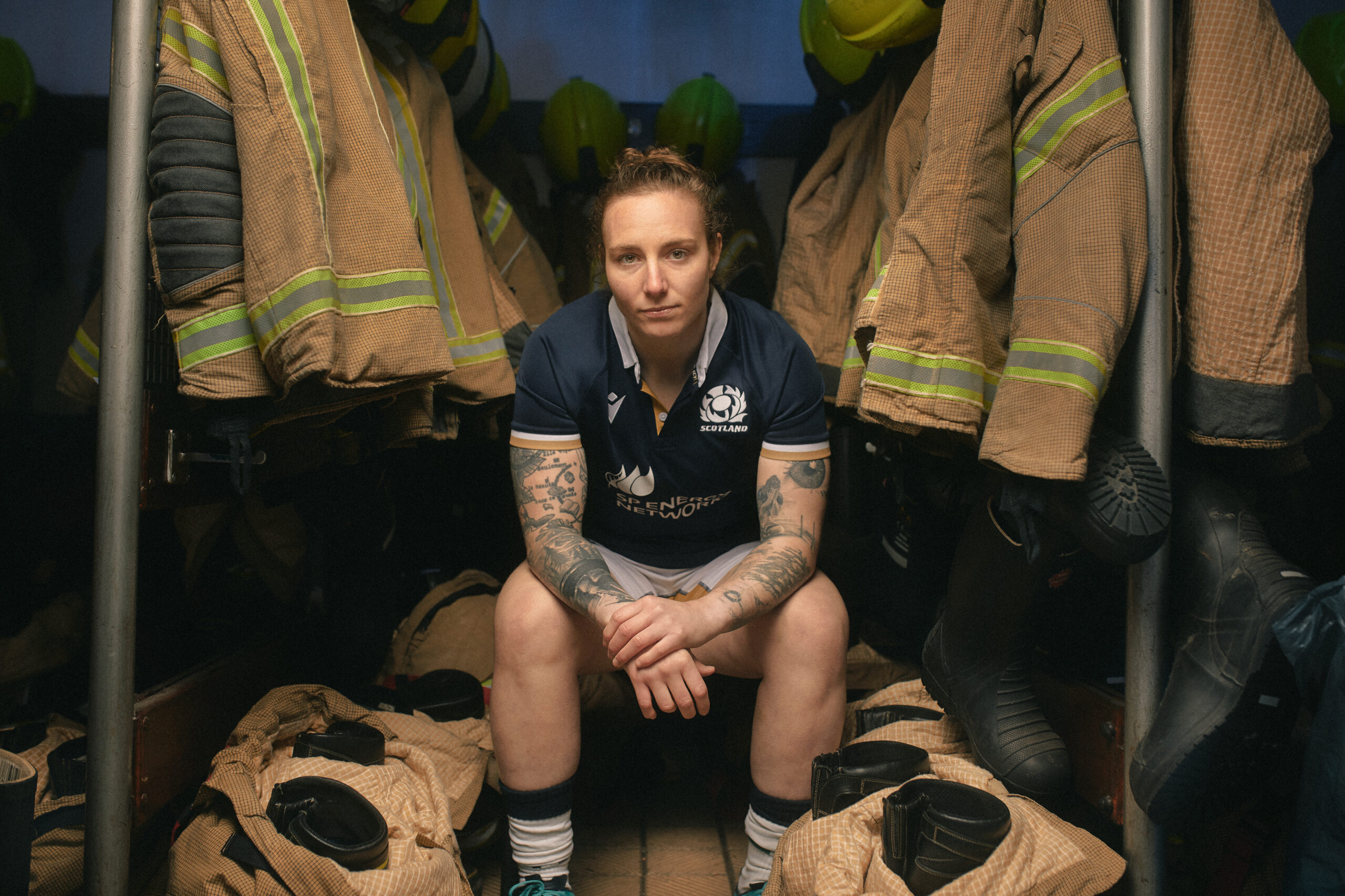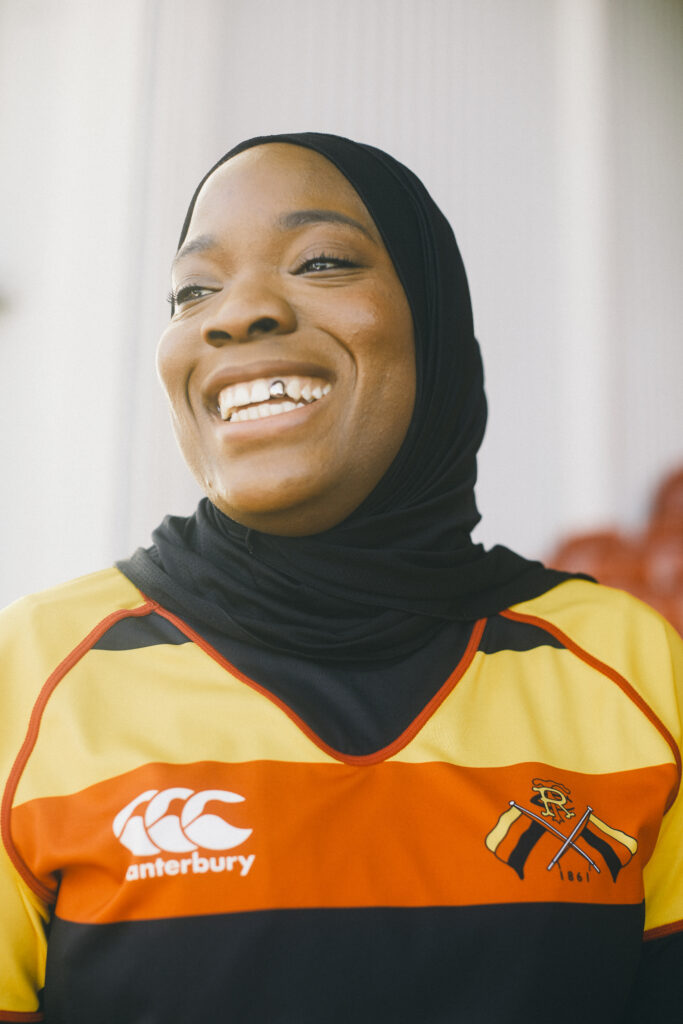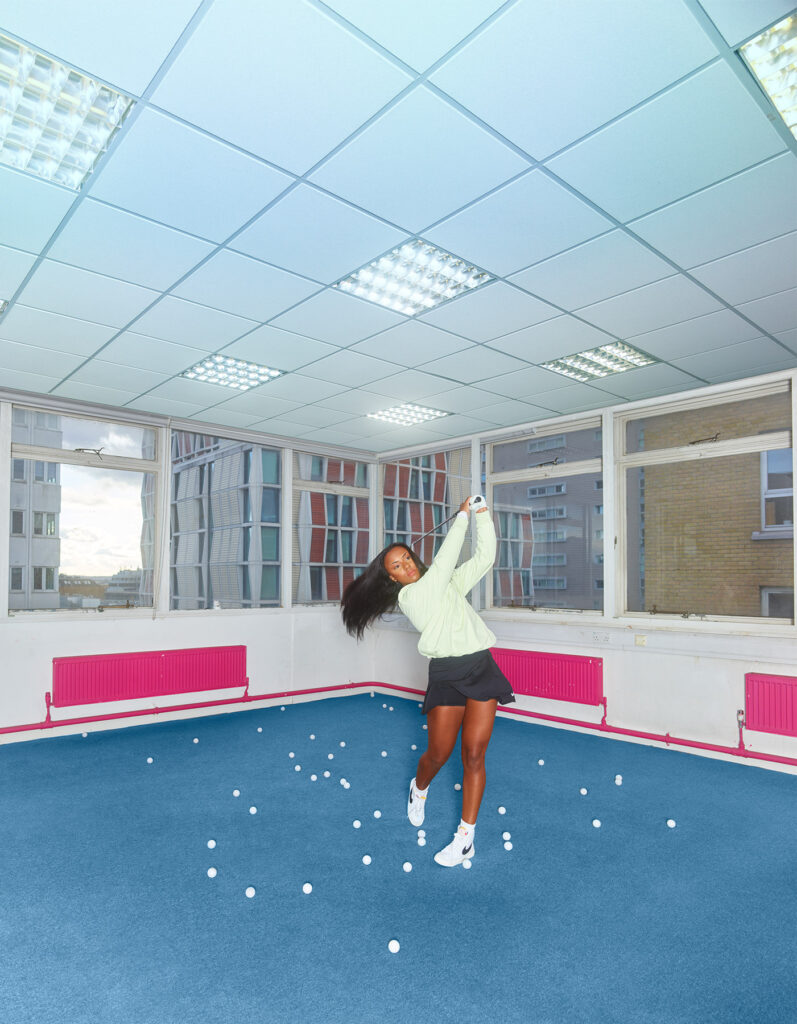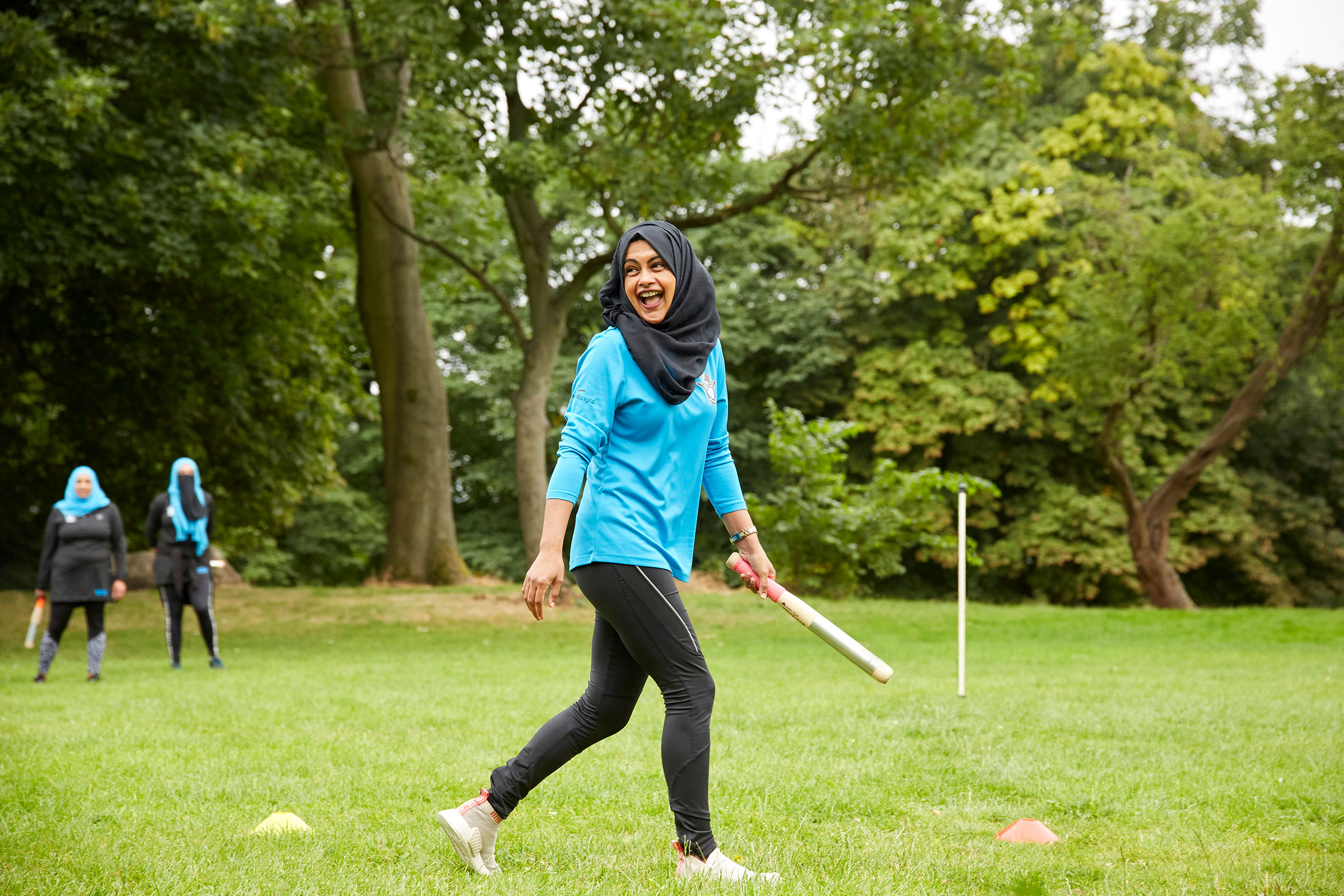
Introducing Glorious Sport, an arts and culture platform dedicated to elevating women’s sport through stunning narratives and visuals.
“We give a platform to stories that deserve to be told and are carving out more space for female voices in sport, be that at grassroots or professional level. By using renowned writers, our compelling stories are complemented beautifully by world-famous photographers, artists and illustrators and engagingly brought to life through cutting-edge films.”
The team at the Sports Book Awards were delighted to speak to Alison Root, Editorial Director of Glorious Sport, about gender and equality in sport, as well as the industry game-changers and books she is inspired by.

Jade Konkel photographed by Ossi Piispanen
Thank you for chatting to us! I’ve been following Glorious Sports for a long time and love what you do! Firstly, why did you start Glorious Sport?
Glorious began in 2021, pre-pandemic, but had been in the works for a number of years! I have a background in sports media and was an editor of a golf magazine for over a decade. My brother (the more ‘arty’ of the two of us!) is a creative director of his own company. He had always moaned that women’s sport, particularly golf, wasn't presented in an aesthetically pleasing way as the imagery was always a bit 'stocky' and boring! We finally sat down and came up with Glorious Golf, but soon realised it was a little too ’niche’, so we opened it up to all women’s sports. We saw a gap in the market to look at women's sports in a more 'lifestyle', holistic way. So GloriousSport.com was born. We want to support and showcase women doing extraordinary things in sport - whether that’s an Olympian smashing a world record, or Karen from down the road going on a wild swim, these stories are championed equally.
We use intelligent storytelling, beautiful visuals, and even real-world events to elevate women’s sport through the lens of art and culture and we're building a community of like-minded women who share our mission. Aside from this, we’re also building a creative community of brilliant writers, photographers and filmmakers who all share an interest in sport.
We release considered, contemporary stories every Friday morning and beginning in May, every story drop will focus on a broad topic that's relevant to our readers’ lives (from community and family to sex and power). We look at each topic through a sports-centric lens. We kicked off today with a Glorious ‘Edition' surrounding the Business of Women's Sport. Our aim is to comprehensively explore each topic, covering all angles that we believe our readers will find interesting, and provide hyper-intelligent, thought-provoking reads that cater to their interests. Essentially, we want people to read and walk away informed and inspired!
Why do you feel it is important for women to have space to celebrate and enjoy female sports?
It's been a long time coming! Women's sport has been underrepresented for far too long, and it's time to change that. The recent surge in interest and investment in women's sport from big business (largely due to the Lionesses' and the Red Roses' success), is a clear sign of progress. By providing space for women to celebrate and enjoy female sports, we can challenge gender stereotypes and promote gender equality. Women's sports have often been overshadowed by men's sports, but by highlighting and celebrating female athletes, we can help break down these barriers and create more opportunities for women in sports and (in our case) creative industries. It's time to support and uplift these women, giving them the space to shine.

Zainab Alema for Women’s Sport Trust photographed by Ossi Piispanen
How do you feel about the notion of “male” and “female” sports? How engrained do you still think this binary is in our sports culture? And how do you approach this at Glorious Sport?
It’s a tricky one! I believe the binary is still very deeply engrained in our sports culture, with separate men's and women's leagues and events. However, there have been efforts in recent years to promote gender inclusivity in sport and we support this. At Glorious Sport, we aim to approach this issue with sensitivity and inclusivity. We recognise the importance of providing spaces for women in sports, but also understand the need to be inclusive of individuals however they identify. We strive to create a welcoming and supportive community for all people, regardless of their gender identity. Our focus is on celebrating women's achievements in sport, promoting gender equality in the sports industry, and we believe that everyone has a role to play in achieving this. Everyone is welcome to join our community.
Why do you think sport has been an arena in which gender and masculinity especially have been so deeply ingrained?
Great question! I think for too long, sport was considered a male-dominated arena because it was seen as a space where strength and competitiveness were traditionally associated with masculinity. This stereotype resulted in women being excluded from participating and viewed as 'weaker' than their male counterparts. Also of note, the sports industry was predominantly controlled by men who held positions of power and decision-making roles. BUT, times are changing! We are witnessing a real shift towards greater gender inclusivity. There is more support and investment for women's sports from brands than ever before, we're seeing a significant increase in audience engagement and growth and far more women in positions of power within the industry. I am optimistic that in the near future, we will not consider sport as a 'masculine’ pursuit.

Nicola Bennett photographed by Dan Burn-Forti
As gender becomes more fluid, how do you think the arena of sports is changing or will change?
Oh this is a difficult one as people have such polarising views! As society becomes more accepting and inclusive of diverse gender identities, the world of sports will have to also evolve to become more inclusive. This means developing policies and practices that ensure the safety and inclusion of all athletes, regardless of their gender identity and we’re slowly seeing this happen. It's important to create a neutral and fair playing field for all athletes while also respecting their individual identities. At Glorious, we strive to provide a platform where people can express their opinions and discuss these topics in a respectful and open-minded manner. Our focus is on promoting inclusivity and diversity in sports, and we're committed to evolving and growing alongside society. This is a really interesting topic that we are planning on dedicating a Friday story drop to later in the summer, looking at gender within sport and meeting the people who are breaking down barriers and driving change so watch this space!
You cover every type of sport, from boxing, to cycling, to surfing and skateboarding. Do you feel that more lifestyle types of sports, rather than more competitive, traditional sports, need more elevation? And how does this fit into the notion of gendered sport?
Yes, absolutely! We believe that every sport has its own unique culture and community that deserves to be celebrated and supported and we try to highlight this. Over the last few years, working on Glorious has opened my eyes hugely to the need to elevate and uplift non-competitive sports. The communities of women we have met and profiled deserve to be celebrated and supported. We've met women who wake up at the crack of dawn to swim in freezing cold lakes, a Muslim rounders team that's now so popular they have a waiting list, and women who are taking on extraordinary adventures whilst juggling their day jobs and family life. In my opinion, their stories are often way more interesting than a male football team's transfer story, or a ‘wow, look how high that person jumped', stats-led story.
Of course, non-professional sports are brilliant in challenging the gendered sport notion because they offer more opportunities for everyone to participate and compete together in a more laid-back setting. They tend to have more relaxed rules around gender categories, which means teams can be more flexible. We’ve covered a number of brilliant grassroots football teams who have a fully inclusive policy and they’re enjoying great success in their Saturday leagues. The idea that someone feels that sport isn’t for them due to their gender identity really upsets me; sport is for everyone and there are loads of amazing communities, particularly in the non-competitive/ professional realm that are fully inclusive.
What other issues relating to diversity in sport do you feel need the most attention?
Gosh, where do I start!? There are just so many diversity issues in sports that need addressing, it's hard to single out just one. However, one of the biggest challenges for women is funding. Female sports are often not funded properly, especially when compared to their male counterparts, which can result in female athletes dropping out due to a lack of support. It's beyond frustrating when I speak to young athletes and they tell me that their ticket to world championships or wherever is being funded by social media brand deals rather than the sport they excel at! To make matters worse, statistics show that young women often have low participation rates in sports at school, and many give up entirely after leaving school. This is largely due to a lack of investment in women's sport and lack of media coverage. I believe that the landscape is changing and due to more funding, visibility and recent women’s sporting success, young women have more role models that they can aspire to, and also see sport / the sports industry as a viable career.
Thankfully we’re seeing the cycle of lack of funding = lack of participation and audience, interrupted and changed. It’s brilliant to see big brands such as O2 committing to a 50-50 split in terms of male and female sports marketing spend and a number of big brands entering the space who haven’t previously been part of the sports landscape. This week we interviewed two top marketeers at M&CSaatchi Sports and Entertainment and they were discussing rights being ‘de-bundled’ from sports streaming deals - i.e. men's rights and women’s rights are sold separately. This is becoming more and more standard. Giovanni Infantino, President of FIFA, was discussing the sustainability of women’s sports recently, suggesting it will become more sustainable when broadcast revenues become more equitable between women’s and men’s games across all sports. Currently, broadcast deals for women’s games are about 20% of what they are for men’s games. FIFA argues that the global viewership for the Women’s World Cup in Australia and New Zealand will be 80-90% of the Men’s World Cup, and therefore, the investment should align. Things are happening!
What are the sports organisations that inspire you most and why?
There are many, but a few that stand out for me: The Women’s Sport Trust is an amazing organisation, for which I have played a very small part by acting as a mentor for the last two years for their Unlocked Programme, which assigns you to an athlete to become a sounding board and offer advice to help them develop their career both inside and outside their sporting arena. They do some incredible research that contributes to their mission to raise visibilty and increase the impact of women’s sport. Six Nations Rugby is doing a fantastic job in promoting the women’s game and that includes the work of Julie Paterson who was the driving force in putting the Women’s Six Nations in its own window. Also the ECB, all credit to them for introducing The Hundred tournament in 2021, which has definitely had a positive impact on introducing more women and girls to cricket and also shines a well-deserved light on female professional players.

Batley Ninjas photographed by Heiko Prigge
A big question, but how can we, as a society, create more space for female voices in sport going forward?
Collectively through all sports media, we need to keep telling women’s sports stories and we need to support and back organisations such as the Women’s Sport Trust who are making an impact. It’s a bit of a cliche, but the more you see and hear about something the more ’normal’ it becomes. I also feel that I should touch on male allies. They are hugely important and whilst there are many- Andy Murray in tennis, David Coulthard in racing, Ugo Monye in rugby, Justin Rose in golf, Ian Wright in football - there need to be more and they need to be louder! Everyone can play their part, it could be as simple as asking your local pub to show a women’s game of football or planning a fun night out to watch a game of women’s basketball!
"due to more funding, visibility and recent women’s sporting success, young women have more role models that they can aspire to"
And lastly, what are the sports books you would recommend?
I was recently given a copy of Bravey: Chasing Dreams, Befriending Pain, and Other Big Ideas by Alexi Pappas. Pappas is a former Olympic runner and creative. It’s a beautifully written book about finding confidence, self-belief and the importance of female role models. It’s a heartbreaking but funny and warm book that I really enjoyed. I’m also really excited to read Ramla Ali’s first new book Not Without a Fight: Ten Steps to Becoming Your Own Champion. She’s such a force and inspiration in the women’s sporting sphere and I’m sure it will be full of wisdom. Of course, Glorious is as much about the visuals as it is the writing, so I have to mention photographer Mária Švarbová’s recent book Swimming Pools. We’re huge fans of Mária and she’s been super supportive of our Glorious journey. Her work is breathtaking, beautiful and a very welcome addition to any coffee table!
Glorious Sport publish new stories every Friday morning at 8am on their website. To find our list of this year’s most inspiring and accomplished new women’s sport writing, check out The Vikki Orvice Award for New Women’s Sports Writing shortlist.
| Cookie | Duration | Description |
|---|---|---|
| cookielawinfo-checkbox-analytics | 11 months | This cookie is set by GDPR Cookie Consent plugin. The cookie is used to store the user consent for the cookies in the category "Analytics". |
| cookielawinfo-checkbox-functional | 11 months | The cookie is set by GDPR cookie consent to record the user consent for the cookies in the category "Functional". |
| cookielawinfo-checkbox-necessary | 11 months | This cookie is set by GDPR Cookie Consent plugin. The cookies is used to store the user consent for the cookies in the category "Necessary". |
| cookielawinfo-checkbox-others | 11 months | This cookie is set by GDPR Cookie Consent plugin. The cookie is used to store the user consent for the cookies in the category "Other. |
| cookielawinfo-checkbox-performance | 11 months | This cookie is set by GDPR Cookie Consent plugin. The cookie is used to store the user consent for the cookies in the category "Performance". |
| viewed_cookie_policy | 11 months | The cookie is set by the GDPR Cookie Consent plugin and is used to store whether or not user has consented to the use of cookies. It does not store any personal data. |